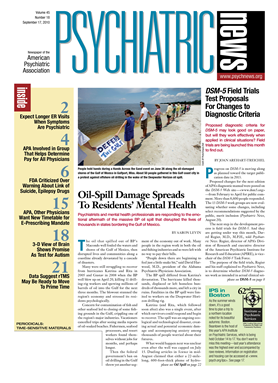New Orleans psychiatrists have been added to the scientific program for next month's APA Institute on Psychiatric Services in Boston to conduct a very timely presentation on the mental health sequelae that have followed the months-long oil spill in the Gulf of Mexico.
Led by psychiatrist Howard Osofsky, M.D., Ph.D., the new session will focus on mental health concerns that have already appeared in many of the individuals who live along the Gulf coast and have had their lives and livelihoods disrupted, with no assurances of when things will return to “normal.” The spill came as a significant number of Gulf state residents were still piecing their lives back together after the destruction Hurricane Katrina wrought in 2005. Many of them now feel beaten down by yet another powerful force beyond their control.
In addition to discussing the mental health problems that have arisen in recent months, presenters will also spotlight symptoms that are likely to appear in the future, how mental health care providers can address those symptoms, and strategies for building individual and community resilience.
Osofsky noted that clinicians in New Orleans and other parts of the Gulf region are already seeing people with, and hearing reports of, anger, anxiety, distrust of authorities, concerns about what the future holds, and a sense that whatever that future may bring, individuals have little power to influence it.
Particularly concerning, he said, is that clinicians and community leaders worry that they are only seeing “the tip of the iceberg” at this point. When the people who have been replacing lost income with pay from BP for helping to clean up after the spill realize that such income is stopping, the number of cases of depression, severe anxiety, substance abuse, and personal and family conflict are likely to increase.
Another topic on the agenda at the institute session is a discussion of a mental health care needs assessment that the Department of Psychiatry at Louisiana State University Health Sciences Center will conduct for the Louisiana Department of Social Services. Also part of this effort will be training of and consultation to counselors in Louisiana Spirit, the state's crisis-response and mental health services program, and advice to education personnel as they reopen schools and preschool programs in the region.
The presenters will also discuss lessons learned from the Gulf oil spill crisis that will be valuable in responding to future technological disasters.


